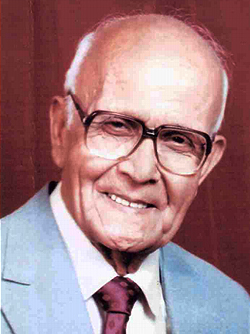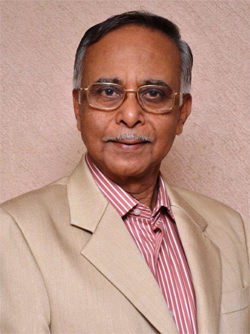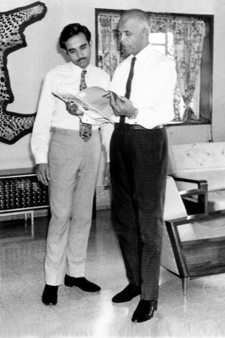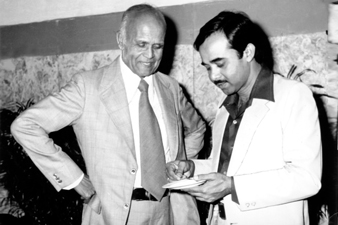
Sterling Engineering Consultancy Services Pvt. Ltd was registered in 1978 and the Founder Members are Late Shri. N. B. Hadker and Mr. Kamal N. Hadker. They set up this practice with the idea of bringing together like minded engineers and creating a pool of talent. Their Vision has driven the company ahead and their Values have constantly guided the organisation throughout the last three successful decades.
 |
Born in 1911, Mr. Hadker graduated as a Civil Engineer from N. E. D Engineering College – University of Bombay - in Karachi in the year 1935. Soon after graduating as a civil engineer he was associated with the Quetta reconstruction project in Baluchistan after the earthquake.
He came to Mumbai in 1937 and worked at the Alcock Ashdown Company. Soon thereafter, he joined McKenzies Ltd. Engineers and Contractors and rose to the position of Chief Engineer - a position he held for thirteen years. In 1950 he set up his independent practice in Mumbai. However, he was invited to work as Chief Engineer for the Sindhu Resettlement Corporation (Kutch) where he was associated with the development of the Township of Gandhidham between the years 1950 and 1952. During the first stage of the Hydro-electric project at Koyna, Mr. N. B. Hadker was responsible as Chief Engineer of Shah, Salzgitter and Jolly, the Contractors appointed to construct the Koyna Dam. He successfully completed the installation of the Plant and Machinery for the Cable-Crane Operation. This project was completed in a record period of two years. In 1959, he returned to Mumbai and renewed his independent practice as a Consulting Engineer The practice gradually expanded to include residential buildings, commercial buildings, sports complexes and multistoried buildings. In 1978, Mr. N. B. Hadker along with his son Mr. Kamal Hadker registered a private limited company named Sterling Engineering Consultancy Services Pvt. Ltd. The scope of their practice widened to include projects abroad. Today, the company has grown into a large organization with four branch offices and staff strength of a hundred people. Mr. Hadker practiced actively up to the age of 90 and took a keen interest in all the important aspects of the organization. He was a Senior Member of the Consulting Engineers Association of India - a Registered Body affiliated to the International Federation of Consulting Engineers, (FIDIC), representing Consulting Engineers from fifty countries throughout the world. He passed away on 11 November 2003 after a brief illness. |
|
| LATE SHRI N. B. HADKER Bachelor of Engineering Member of the Institution of Engineers, India Member of Consulting Engineers Association of India |
||
|
|
||
 |
Born in 1941, Kamal Hadker completed his Bachelor of Engineering Degree from the University of Mumbai in 1963. After working under the guidance of his father, Mr. N. B. Hadker, for two years, he proceeded to London, UK to acquire first-hand experience of working for British firms of Consulting Engineers. In 1967 he was elected as an associate member of the Institution of Structural Engineers, London, UK. He returned to India in 1968 and joined the rapidly expanding practice of M/S Hadker Prabhu and Associates. In the years that followed, he was actively involved in the structural design of prestigious high-rise buildings and major sports complexes in the country as well as abroad. His innovative approach to design and constant search for efficient structural solutions secured him an excellent reputation. Kamal Hadker has distinguished himself in the design of some of the country’s most prominent landmarks. Some of these are - The Bombay Stock Exchange, The ICICI Building in Mumbai, Public Utility Building in Bangalore, MRF Headquarters in Madras, The Andheri Sports Complex and the Wankhede Stadium in Mumbai and the IFCI Building in New Delhi. For the Asian Games held in New Delhi in 1982, he led a team of structural designers for the prestigious Indira Gandhi Stadium and other surrounding structures. This Stadium, which is the largest clear-span roof in Asia and third largest in the world, was designed and built in a record period of 27 months. Kamal Hadker has gained valuable experience with International Architects such as WATG, SOM, RTKL, JPA etc who have worked on Indian Projects. With an ability to understand client expectations and to deliver quality buildings on time and within budget, Kamal Hadker has secured a broad client base. Kamal Hadker has played a key role in achieving sustained growth for the Company across four decades and is now ever better poised to face the dynamics and challenges of the future. |
|
| KAMAL N. HADKER CHAIRMAN Bachelor of Engineering (CIVIL) Member of Institution of Structural Engineers, UK Member of Institute of Engineers, India |
||
Mr. Kamal Hadker is a member of the following institutions: |
||
 |
 |
 |
| The mission of the organization is to deliver outstanding Value to Clients with innovation and technical excellence while maintaining profitability. The fundamental purpose of this organization is to consistently make a positive contribution to the built environment. |
 |
 |
| Home | Contact Us | Newsletters | Financials | Careers © copyrights . www.sterlingengg.com. All rights reserved |